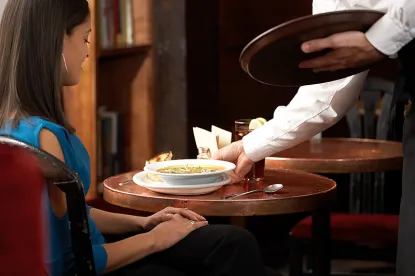In a welcome sea change for the hospitality industry, the U.S. Department of Labor (DOL) announced on July 20, 2017 that it would repeal the Obama administration’s 2011 regulations that severely curtailed tip pooling. The DOL further announced that, as it works to finalize the repeal, its investigators are barred from enforcing the Obama-era rule.
This is particularly good news for the hospitality industry in states within the Ninth Circuit. That court’s 2016 split decision in Oregon Restaurant and Lodging Association v. Perez rendered the tip pooling practices of many hospitality companies invalid if the pools included “back of the house” employees.
Tip Pooling and Tip Credits
Tip credits allow some employers, where not otherwise limited by state law, to reduce the wages paid to service employees based upon their anticipated tips in order to meet minimum wage requirements.
Under a prior 2010 decision in the Ninth Circuit, Cumbie v. Woody Woo, Inc., the court had found that employers that did not utilize tip credits could implement tip pooling policies that included “back of the house” employees. It held that tip pooling policies that required employees who are customarily and regularly tipped (e.g., servers) to share their tips with those who are not regularly tipped (e.g., bussers, kitchen staff, and hostesses) were valid under the Fair Labor Standards Act (FLSA).
In the restaurant industry, the tip pooling practice of including back of the house employees was part of a shift in which restaurants became more food driven and restaurant-employers started seeking ways in which to compete for top kitchen talent in extraordinarily tight labor markets. The Department of Labor’s announcement recognizes these significant changes within the industry.
The Obama Administration’s 2011 Regulations
In 2011, in a response to the Cumbie decision, the Obama administration promulgated regulations, clarifying that such tip pools were a violation of the FLSA. The 2011 DOL regulations stated:
Whether a tip is to be given, and its amount, are matters determined solely by the customer, who has the right to determine who shall be the recipient of the gratuity. Tips are the property of the employee whether or not the employer has taken a tip credit under section 3(m) of the FLSA. The employer is prohibited from using an employee’s tips, whether or not it has taken a tip credit, for any reason other than that which is statutorily permitted in section 3(m): As a credit against its minimum wage obligations to the employee, or in the furtherance of a valid tip pool.
29 C.F.R. § 531.52 (2011).
These regulations effectively extended the statutory tip pooling restrictions of the FLSA to all employers, regardless of whether the employers took advantage of tip credits.
The hospitality industry immediately challenged those regulations, and the regulations were not enforced within the Ninth Circuit until February 2016, when a split Ninth Circuit sided with the Obama administration in Oregon Restaurant and Lodging Association. That decision declared that the 2011 Department of Labor regulations were permissible, and all employers were thereafter barred from utilizing tip pooling policies that included employees who are not customarily and regularly tipped.
In January 2017, the National Restaurant Association, Oregon Restaurant and Lodging Association, Washington Restaurant Association, and Alaska Cabaret, Hotel Restaurant and Retailers Association filed a petition for writ of certiorari with the Supreme Court of the United States. Although the Department of Labor’s response to the cert. petition was due in February, the DOL obtained a number of extensions and its response is now extended to September 8, 2017.
What Does This Mean for Employers?
While this decision is good news for hospitality employers, the 2011 regulations remain the law until repealed. Companies may want to wait to revise their tip pooling policies until the new regulations become effective. Even if the Department of Labor is not actively enforcing the 2011 regulations, there remains a risk of private litigation.
Proposed regulations are expected in August. Employers interested in shaping the final regulations may participate in the public comment period, once the Department of Labor issues the proposed regulations.
The rulemaking process may take up to 12 months to complete.



 />i
/>i

